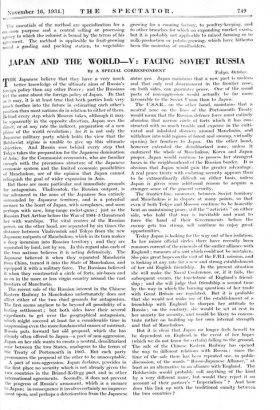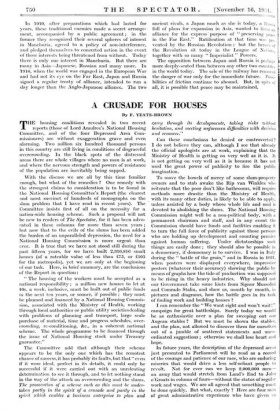JAPAN AND THE WORLD V: FACING SOVIET RUSSIA
By A SPECIAL CORRESPONDENT
relinquish the goal of wider expansion in Asia. to be extraordinarily difficult on either basis, unless But there are more particular and immediate grounds Japan is given some additional reason to acquire a for antagonism. Vladivostok, the RuSsian outpost, is stronger sense of the general security.
far advanced in the zone of the Japanese Sea entirely The frontier-line, moreover, between Soviet territory surrounded by Japanese territory, and is a potential and Manchukuo is in dispute at many points, so that menace to the heart of Japan, with aeroplanes, and. soon even if both Tokyo and Moscow continue to be honestly perhaps with new, long-range rocket-guns ; just as the bent on maintaining peace, still the " activists " on either Russian. Port Arthur before the War of 1904-5 threatened side, who hold that war is inevitable and want to her with warships. The vital centres of the Russian force the hand of their Governments before the power, on the other hand, are separated by six times the enemy gets too strong, will continue to enjoy great distance between Vladivostok and Tokyo from the new opportunities.
Japanese outposts of Manchukuo, which in its turn makes Today Japan is looking for the way out of her isolation. a deep incursion into Russian territory ; and they are In her minor official circles there have recently been separated by land, not by sea. In this regard also each of rumours current of the renewals of the earlier alliance with the two nations believes it is acting defensively. The England ; rumours of a sort which could not be mistaken. Japanese believed it when they separated Manchuria She pins great hopes on the visit of the F.B.I. mission, and from China, turned it into the State of Manchukuo, and is looking at any rate for a new and strong establishment equipped it with a military force. The Russians believed of her old English friendship. In the present situation it when they constructed a circle of forts, air-bases and she will make the Naval Conference, or, if it fails, the so on in the more or less virgin country around the vast subsequent events, the touchstone of England's friend- frontiers of Manchuria. ship ; and she will judge that friendship a second time Eastern Railway to Manchukuo unfortunately does not with Great Britain are regulated. But it is probable affect either of the two chief grounds for antagonism. that she would not make use of the establishment of a The first seems anyhow to be beyond all possibility of a friendship with England to sharpen her attitude to lasting settlement ; but both sides have their several Russia ; on the contrary, she would be set at rest in expedients to get over the geographical antagonism; her anxiety for security, and would be likely to concen- which might succeed at least for a considerable time in trate rather on building up her own internal strength suppressing even the more fundamental causes of mistrust. and that of Manchukuo.
Russia puts forward her old proposal, which she has But it is clear that Japan no longer feels herself to already often offered to Japan—a pact of non-aggression. he dependent on England, in the event of her hopes Japan on her side wants to create a neutral, demilitarized (which we do not know for certain) falling to the ground. zone between the two States, analogous to the terms of The sale of the Chinese Eastern Railway has opened the Treaty of Portsmouth in 1905. But each party the way to different relations with Russia ; since the pronounces the proposal of the other to be unacceptable. time of the sale there has been repeated use, in public the first place no security which is not already given the least as an alternative to an alliance with England. The two countries in the Briand-Kellogg pact and in other Bolshevists would probably call anything of the kind international agreementi: Secondly, it does not prevent by a very different name, but would they reject it on the progress of Russia's armament, which is a menace account of their partner's " Imperialism " ? And how to Japan; in consequence it involves certainly no improve- does this link up with the traditional enmity between ment upon,-and -perhaps a deterioration from the Japanese the two countries ? Tokyo, October.
The recent sale of the Russian interest in the Chinese by the way in which the burning questions of her trade A pact of non-aggression, Japan declares, provides in discussion, of the words " Russo-Japanese Alliance," at In 1910, after preparations which had lasted for years, these traditional enemies made a secret arrange- ment, accompanied by a public agreement ; in the former they recognized their several spheres of interest in Manchuria, agreed to a policy of non-interference, and pledged themselves to concerted action in the event of those interests being threatened from without. Today there is only one interest in Manchuria. But there are many in Asia—Japanese, Russian and many more. In 1916, when the world was engaged in the European War and had not its eye on the -Far East, Japan and Russia signed a regular treaty of alliance, intended to run a day longer than the Anglo-Japanese alliance. The two ancient rivals, a Japan much as she is today, a 'Russia full of plans for expansion in Asia, wanted to form an alliance for the express ' purpose of " preserving pea„ in the Far East." Ratification at that time was pre- vented by the Russian Revolution ; • but the heroes of the Revolution sit today in the League of Nations, together with so many " Imperialist ," Powers.
The opposition between Japan and Russia is perhap more deeply-seated than between any other two countries in the world today. The sale of the railway has removed the danger of war only for the immediate future. Possi- bilities of friction continue to abound: But, in spite of all, it is possible that peace may be maintained.







































 Previous page
Previous page